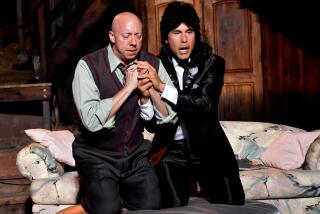One Century’s Biting Social Satire Is Another’s Sitcom
LA JOLLA--Before things get out of control, Cleante asks his brother-in-law Orgon the question at the heart of the La Jolla Playhouse’s snappy and semi-naughty production of Moliere’s “Tartuffe”: “How could you be such a goose?”
Like the rest of us, Cleante (Jonathan Adams) cannot understand why the wealthy and presumably wise Orgon (John Getz) can be so bamboozled by that sneaky deceiver Tartuffe (Jefferson Mays).
The answer is simple: Unless Orgon falls hook, line and inheritance for Tartuffe’s fraudulent piety, there is no play. It does not pay to ask reality-based questions of this or any other modern “Tartuffe.”
When the play hit Paris in 1664, it was a scandalous sendup of the dimwitted upper classes and the hypocritical and licentious clergy. But the intervening centuries have sapped nearly all of the zip from the social satire, and targets that were once deliciously off limits have become common punching bags.
What remains of “Tartuffe”--particularly with the rhyming couplet translation of poet Richard Wilbur--are the conventions and pacing of a TV sitcom. Think of the better episodes of “Frasier,” complete with misunderstandings, randy longings, crisp dialogue and splenetic verbal combat.
To the credit of Tony Award-winning director Des McAnuff, he has delivered a “Tartuffe” whipped to a comedic frenzy, light and unchallenging perhaps, but a definite crowd-pleaser.
Mays, as Tartuffe, is a slick, articulate, reptilian delight, with an occasional mugging wink at the audience. Getz is both foolish and likable as Orgon, who gets wised up to Tartuffe’s chicanery only late in the play. Adams as Cleante is suitably exasperated at Orgon and serves as the voice of blustery and frustrated reason.
But it is the women’s roles that shine the brightest and bring “Tartuffe” alive with one-liners about the ignorance and silliness of men.
Nadia Bowers as Orgon’s daughter Mariane--distressed at her father’s insistence that she marry Tartuffe--is sexy and knowing, and the hit of the show.
Mariane’s servant Dorine (Paget Brewster) is every uppity underling who speaks the truth even if the boss does not want to hear it. She explains why women stray from bored and boring husbands: “Many a man with horns upon his brow made his wife what she is now.”
John Campion as the grande dame Madame Pernelle is a delight in drag. And the farcical seduction scene between Tartuffe--stringy hair, shabby clothes and all--and Orgon’s wife, Elmire (played wonderfully by Klea Scott), is a show-stopper.
Other productions of “Tartuffe” have the con man as a tall, well-dressed smoothie, making it easier to understand his hypnotic appeal. But McAnuff wants nothing between the audience and the rapid-fire gags, and the result is a funny, if not nuanced portrayal.
Although this “Tartuffe” takes few chances, it does begin and end with a bit of physicality that is shocking and, in the first instance, quite eye-pleasing.
There’s also a gross-funny bit with Dorine and a novel way of filling a wine glass. Hint: This is something they cannot do on television.
*
“Tartuffe,” La Jolla Playhouse, UC San Diego, La Jolla Village Drive at Torrey Pines Road, La Jolla. Tuesdays-Fridays, 8 p.m.; Saturdays, 2 and 8 p.m.; Sundays, 2 and 7 p.m. Ends June 16. $19- $49. (858) 550-1010. Running time: 2 hours, 15 minutes.
Jefferson Mays...Tartuffe
John Getz...Orgon
Klea Scott...Elmire
Paget Brewster...Dorine
Jonathan Adams...Cleante
John Campion...Madame Pernelle
Nadia Bowers...Mariane
Written by Moliere, English translation by Richard Wilbur. Directed by Des McAnuff. Set Robert Brill. Costumes Jess Goldstein. Lighting Chris Parry. Sound Robbin Broad.
More to Read
The biggest entertainment stories
Get our big stories about Hollywood, film, television, music, arts, culture and more right in your inbox as soon as they publish.
You may occasionally receive promotional content from the Los Angeles Times.










